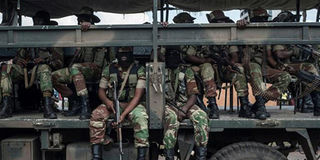Zimbabwe police, army to patrol together after Mugabe ouster

Zimbabwe's defence forces took charge of the country on November 14 in what they said was a move to remove "criminals" surrounding the then president Mugabe
What you need to know:
“You will soon notice the Zimbabwe Defence Forces and Zimbabwe Republic Police members conducting joint patrols, especially in the Harare central business district,” police spokeswoman Charity Charamba said.
Harare, Zimbabwe | AFP | Zimbabwe’s police and army will stage joint patrols as the country returns to normal after an army takeover that led to Robert Mugabe's resignation, the authorities announced Monday.
“You will soon notice the Zimbabwe Defence Forces and Zimbabwe Republic Police members conducting joint patrols, especially in the Harare central business district,” police spokeswoman Charity Charamba said.
“We urge you all progressive Zimbabweans to respect the country’s laws and cooperate with our officers as they perform their duties," Charamba said, reading from a joint statement of the police and defence forces.
Zimbabwe Defence Forces spokesman Overson Mugwisi sternly warned those who had committed crimes during the crisis, when police numbers were under strain.
"Law enforcement agents are already receiving reports of looting and illegal occupation of other people’s properties, particularly farms and houses,” Mugwisi said.
“This behaviour is criminal and against the spirit of non-vengeful retribution, and will be met with the full wrath of the law.”
Zimbabwe’s defence forces took charge of the country on November 14 in what they said was a move to remove "criminals" surrounding the then president Mugabe.
Following the defence forces announcement, war veterans, opposition and civic society groups rallied Zimbabweans to take to the streets in a no-confidence vote on Mugabe and his allies.
The call saw Zimbabweans of all political and racial backgrounds throng the streets of the country’s three major cities in protests against Mugabe’s rule.
The 93-year-old president resigned last Tuesday after his party expelled him and parliament began proceedings to impeach him.
His 37-year tenure was marked by accusations of rights abuses, electoral fraud and economic ineptitude.
He was replaced by his long-time ally Emmerson Mnangagwa, who had fallen out with Mugabe after the president sided with his 52-year-old wife Grace in a bitter succession battle.
Grace Mugabe, who led a faction calling itself Generation 40, accused Mnangagwa of plotting to topple her husband.




